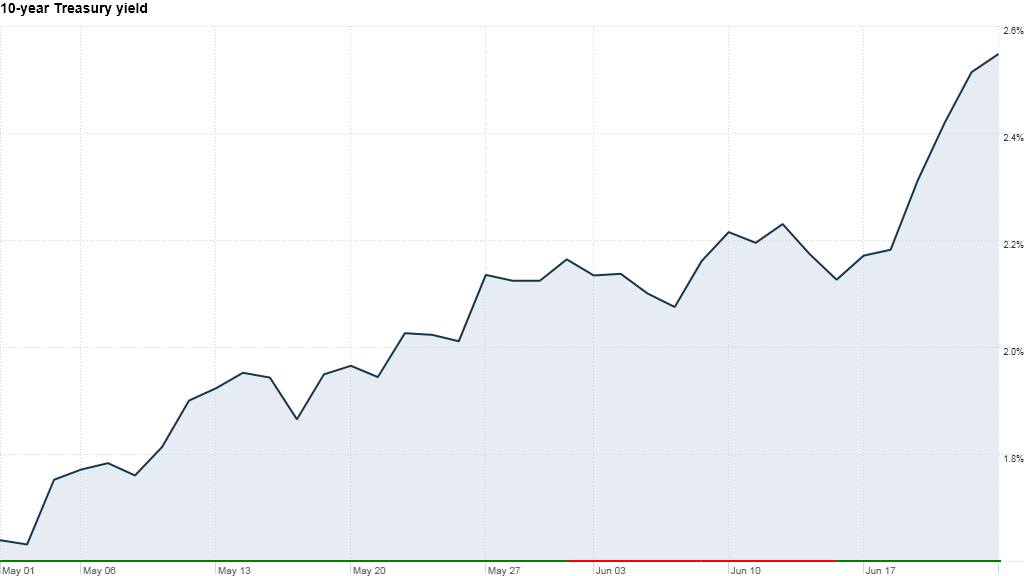The sell-off in U.S. Treasuries has been jarring for investors, but some see opportunities arising in other corners of the bond market.
The yield on the 10-year Treasury note hit 2.65% Monday, its highest level since August 2011.
The rise in yields, which move opposite to price, comes as investors anticipate an eventual winding down of the Federal Reserve's $3 trillion bond-buying program.
Investors pulled more than $500 million out of taxable bond mutual funds and ETFs in the week ended June 19, according to data from Lipper. There was a $333 million outflow from high yield bond funds as well.
Municipal bonds, which are popular among individual investors, have been punished more than Treasuries. The iShares Municipal Bond Fund (MUB)ETF has plunged 9% in just over a month.
The exodus has raised concerns that the 30-year bull market in U.S. debt is drawing to a close.
But some analysts say investors are overreacting to the latest statements by Fed chairman Ben Bernanke, who has stressed that the central bank will do more if the economy falters.
"I think that soon, investors will figure this out and start to buy again," said Kevin Giddis, head of fixed-income at Raymond James. "In the meantime, it is hard to watch."
Related: Investors are being 'feral hogs'
On the upside, falling bond prices mean higher yields, which is what many investors have been seeking, said Kathy Jones, fixed-income strategist at Charles Schwab.
Jones said high-quality corporate bonds and municipal bonds are particularly attractive right now.
Last week, yields on a basket of AAA-rated 10-year municipal bonds rose 40 basis points to 2.63%, according to Municipal Market Data.
"The muni market is trading at almost 110% of Treasuries," said Matt Freund, chief investments officer at USAA Mutual Funds. "That means you get paid more and the tax benefit is free. We think that's an investment that makes sense."
Freund said commercial mortgage-backed securities, high yield bonds and corporate debt are other areas of the bond market that offer a compelling alternative to Treasuries. But he stressed that bond investors need to be diverse and have a longer-term perspective.
Despite the recent turmoil, most fixed-income managers say Treasury yields are trading where they should be, given the outlook for modest economic growth and tepid inflation in the United States.
"Relative to the fundamentals, we seem pretty fairly valued right now," said Jones, although she said yields could "overshoot" to 2.9%
While the U.S. economy has shown signs of improvement, the outlook remains modest and economists say weakness in China and other emerging markets could have a negative impact.
Related: China's big credit gamble
Inflation, which can severely erode the value of fixed-income assets, has been exceptionally low. The Fed is now calling for an inflation rate of about 1% this year, versus its previous forecast of around 1.5%.
One thing seems clear, the bond market (and most other markets for that matter) will be choppy for a while, and more conservative investors will probably stay on the sidelines until the coast is clear.
Guy LeBas, managing director of fixed-income at Janney Capital Markets, said the recent sell-off in Treasuries has been driven largely by short-term investors, such as hedge funds, that are "deleveraging" complex trades.
"Every real money manager I talk to finds these levels to be attractive," he said. "Once we get one or two days of stability, I think the real money managers will step in and create a floor."



